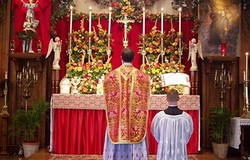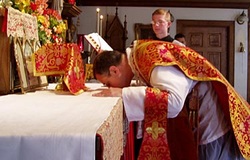Mass is rightly divided into six parts.
- The first part is the preparation for the sacrifice and this is made at the foot of the altar.
- The second part extends from the Introit to the Credo, inclusively and was formerly called the Mass of the Catechumens, who had to leave the church after the Credo.
- The third part contains the Offertory and the Preface.
- The fourth part comprises the Canon with the Pater Noster; for the Canon in olden times finished with the Pater Noster, as a learned author concludes from a passage in the writings of St. Gregory the Great.
- The fifth part begins with the prayer Libera nos, quaesumus, Domine (Deliver us, O Lord, we beseech Thee), which is a preparation for Communion, and includes Communion.
- The sixth and last part comprises under the form of thanksgiving the rest of the Mass.

In nomine Patris et Filii et Spiritus Sancti. Amen
(“In the name of the Father and of the Son, and of the Holy Ghost. Amen).
In order to sacrifice a victim one must have the power over its life and death; but as God only has the power over the life of his incarnate Son, who is the victim of the Sacrifice of the Mass, the priest needs divine authority in order to be able to offer Jesus Christ to his heavenly Father. Yet as he is invested with the authority that belongs to the priesthood, he says, in union with Jesus Christ, who is the principal one that offers that sacrifice, In the name of the Father and of the Son, and of the Holy Ghost; thus declaring that he offers the sacrifice by the authority of the three Persons.
The priest afterwards recites the antiphon Introibo ad altare Dei (“I will go the the altar of God”), and the psalm Judica me Deus (“Judge me O God”). He implores help against the enemies of God they who are laying snares for him. Then expressing the pain that he feels of seeing himself, as it were, rejected by the Lord, he begs him to assist him with his light, and to console him with the graces that he promised by leading him into his tabernacle. Finally, he reproaches himself for indulging in fear, for why should he be troubled when he has with him his God in whom he should confide?
Innocent III. attests that the recitation before Mass of the psalm Judica me was the custom of his time, that is, in the twelfth century; and Cardinal Lambertini, afterwards Benedict XIV.,assures us that it was recited before the eighth century. The psalm is concluded with the Gloria Patri. It was Pope St. Damasus who ordained that each psalm should be concluded in this manner. It is, however, believed that the Gloria Patri was introduced by the Council of Nice or, as we are told by Baronius and St. Basil, even by the Apostles, the Council of Nice having added only these words, Sicut erat, etc.
Adjutorium nostrum in nomine Domini ('Our help is in the name of the the Lord'). Frightened by grandeur of the act he is about to perform, and by the thought of his unworthiness, the priest asks God's help in the name of Jesus Christ; and acknowledging himself guilty, he accuses himself of his sins, not only before God, but before the Blessed Virgin and all the saints, who on the last day, with Jesus Christ, will pronounce judgment upon sinners.
Deus, tu conversus, vivificabis nos ('Thou, O Lord,' says the priest, 'wilt turn and bring us to life'). The sinner remains in death so long as God in his goodness does not come to restore to him the life of grace. Then he implores anew the divine mercy: Ostende nobis, Domine, misericordiam tuam ('Show us, O Lord, Thy mercy') ; and supplicates the Lord to hear him: Domine, exaudi orationem meam ('O Lord, hear my prayer').
Before leaving the people to go up to the altar, the priest says to them, Dominus vobiscum ('The Lord be with you'). By these words he wishes and asks that Jesus Christ may grant to the people as well as to himself the effects of the prayers that he has said; and the server expresses to him the same wish when answering for all the people: Et cum spiritu tuo ('And with Thy spirit'). These reciprocal wishes indicate the union of faith in Jesus Christ that exists between the priest and the people.
Aufer a nobis, etc. ('Take away from us our iniquities, etc.'). In going up the steps of the altar, the priest begs the Lord to deliver him from all iniquities, in order that he may approach the Holy of Holies with a pure heart; that is to say, in order that he may worthily offer up the great sacrifice.

From the first ages the Church was accustomed to offer up the Eucharistic sacrifice on the tombs of the martyrs who had sacrificed their lives for God, and who for this reason have always been particularly honored in the Church. During the first period of the Church there were no other festivals than those of the mysteries of Jesus Christ, those of the Blessed Virgin, and the anniversaries of the martyrs. However, it is not to the saints, but only to God that altars are erected, “and,” as St. Augustine says, “we have not erected an altar to the martyr, Stephen, but with the relics of the martyr Stephen we have erected an altar to God.”1
1 “Nos, in isto loco, non aram fecimus Stephano, sed de reliquiis Stephani aram Deo” Serm. 318, E. B.
Second Part




